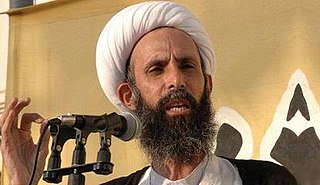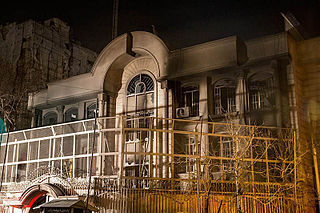
Human rights in Saudi Arabia are a topic of concern and controversy. The Saudi government, which mandates both Muslim and non-Muslim observance of Islamic law under the absolute rule of the House of Saud, has been accused of and denounced by various international organizations and governments for violating human rights within the country. The authoritarian regime ruling the Kingdom of Saudi Arabia is consistently ranked among the "worst of the worst" in Freedom House's annual survey of political and civil rights.
Qatif or Al-Qatif is a governorate and urban area located in Eastern Province, Saudi Arabia. It extends from Ras Tanura and Jubail in the north to Dammam in the south, and from the Persian Gulf in the east to King Fahd International Airport in the west. This region has its own municipality and includes the Qatif downtown, Safwa, Saihat, Tarout Island, and many other smaller cities and towns.
Islam is historically divided into two major sects, Sunni and Shia Islam, each with its own sub-sects. Large numbers of Shia Arab Muslims live in some Arab countries including Lebanon, Yemen, Bahrain, Iraq, Saudi Arabia, Kuwait, Oman, the UAE, and Qatar.
Capital punishment exists in Saudi Arabia, with most executions in the country being carried out by decapitation (beheading) – Saudi Arabia being the only country in the world to still use the method. In 2022, recorded executions in Saudi Arabia reached 196, the highest number recorded in the country in 30 years.
The Saudi government does not conduct a census on religion or ethnicity, but some sources estimate the Shia population in Saudi Arabia to make up around 20% of the approximately 34 million natives of Saudi Arabia.
Al-Awamiyah, also spelled Awamia, is a town situated in the Al-Qatif region in the Eastern Province of Saudi Arabia. As of 2009, it has a population of about 25,500 people. Al-Awamiyah is bordered by the Al-Ramis farms to the east and some other farms to the west and the south. To the north side, there is a dividing line between Al-Awamiyah and the neighboring Safwa city, so the town cannot expand any more and provide housing land for its growing population. Due to this limited land, the people move out of the town and settle in nearby neighborhoods, notably Al-Nasera which is home to almost 2500 people living in 250 homes.

The protests in Saudi Arabia were part of the Arab Spring that started with the 2011 Tunisian revolution. Protests started with a self-immolation in Samtah and Jeddah street protests in late January 2011. Protests against anti-Shia discrimination followed in February and early March in Qatif, Hofuf, al-Awamiyah, and Riyadh. A Facebook organiser of a planned 11 March "Day of Rage", Faisal Ahmed Abdul-Ahad, was allegedly killed by Saudi security forces on 2 March, with several hundred people protesting in Qatif, Hofuf and al-Amawiyah on the day itself. Khaled al-Johani demonstrated alone in Riyadh, was interviewed by BBC Arabic Television, was detained in ʽUlaysha Prison, and became known online as "the only brave man in Saudi Arabia". Many protests over human rights took place in April 2011 in front of government ministry buildings in Riyadh, Ta'if and Tabuk and in January 2012 in Riyadh. In 2011, Nimr al-Nimr encouraged his supporters in nonviolent resistance.

The following is a timeline of the 2011–2012 Saudi Arabian protests from January to April 2011. The 2011–2012 Saudi Arabian protests are a series of ongoing protests taking place in Saudi Arabia, which began in January 2011, influenced by concurrent protests in the region.

The following is a timeline of the 2011–2012 Saudi Arabian protests from May to December 2011. The 2011–2012 Saudi Arabian protests are a series of ongoing protests taking place in Saudi Arabia, which began in January 2011, influenced by concurrent protests in the region.

The following is a timeline of the 2011–2012 Saudi Arabian protests from January to June 2012. The 2011–2012 Saudi Arabian protests are a series of ongoing protests taking place in Saudi Arabia, which began in January 2011, influenced by concurrent protests in the region.

Ayatollah Sheikh Nimr Baqir al-Nimr, commonly referred to as Sheikh Nimr, was a Shia sheikh from Al-Awamiyah in Saudi Arabia's Eastern Province whose arrest and execution was widely condemned, including by governments and human rights organizations.

Anti-Shi'ism is hatred of, prejudice against, discrimination against, persecution of, and violence against Shia Muslims because of their religious beliefs, traditions, and cultural heritage. The term was first used by Shia Rights Watch in 2011, but it has been used in informal research and written in scholarly articles for decades.

The following is a timeline of the 2011–2012 Saudi Arabian protests since July 2012. The 2011–2012 Saudi Arabian protests are a series of ongoing protests taking place in Saudi Arabia, which began in January 2011, influenced by concurrent protests in the region.

The 1979 Qatif Uprising, also known as the Muharram Intifada was a period of unprecedented civil unrest that occurred in Qatif and Al-Hasa, Saudi Arabia, in late November 1979. The unrest resulted in 20–24 people killed in what was described as a sectarian outburst of violence between the Shi'a minority and Sunni majority in Saudi Arabia and the beginning of the modern phase of the Qatif conflict.
Nimr Baqir al-Nimr was a Shia cleric and critic of the government in Saudi Arabia, who was beheaded on 2 January 2016, one of 47 people executed that day for terrorism offenses. Others executed included Sunnis who had been convicted of involvement in terror attacks linked to al-Qaeda which took place in 2003. News of the killings triggered international demonstrations, and condemnation by nations, supranational organizations, and human rights groups.

The 2016 attack on the Saudi diplomatic missions in Iran was a mob action on 2 January 2016 by protesters against the execution of a prominent Saudi Arabian Shi'a cleric. Mobs stormed the embassy in Tehran and the Saudi consulate in Mashhad and ransacked them. The embassy building was set on fire with Molotov cocktails and petrol bombs. During the attacks, the police arrived and dispersed protesters from the embassy premises and extinguished the fire.
The 2017–2020 Qatif unrest was a phase of conflict in the Qatif region of Eastern Province, Saudi Arabia, between Saudi security forces and the local Shia community, that arose sporadically starting in 1979, including a series of protests and repression during the 2011–12 Saudi Arabian protests.
Israa al-Ghomgham is a Saudi Arabian human rights advocate. She is especially known for her documentation of the 2017–18 Qatif unrest.
On 23 April 2019, the Kingdom of Saudi Arabia carried out a mass execution of 37 imprisoned civilians who had been convicted, 21 on the basis of confessions allegedly obtained under coercion and torture, for terrorism-related allegations in six provinces in the country. Fourteen of the people executed had been convicted in relation to their participation in the 2011–12 Saudi Arabian protests in Qatif, mostly on the basis of torture-induced confessions. The executions were carried out by beheading, and two of the bodies were left on public display. According to Saudi Arabia's Interior Ministry the convicts were all Saudi nationals. Thirty-two of those executed belonged to the country's Shia minority.

Sectarianism in Saudi Arabia refers to the Saudi government's "top-down push towards sectarian polarization" between the Sunni majority, and Shi'ite minority. This encompasses anti-Shi'ite policies by the Saudi regime, as well as tensions between the Sunni majority and the Shi'ite minority. The Saudi government is often viewed to be oppressing the Shi'ite community, who constitute up to 15% of the Saudi population. This occurs against the backdrop of the broader Iran-Saudi Arabia proxy conflict, since Iran is a Shi'ite republic.







